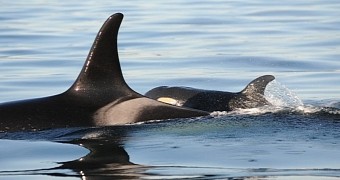Wildlife researchers with the US National Oceanic and Atmospheric Administration are happy to announce that, not too long ago, a baby killer whale was spotted swimming around Puget Sound, a large Pacific Ocean inlet stretching along the coast of the state of Washington.
The reason scientists were so happy to catch a glimpse of this young killer whale is that the calf was born to a pod that last welcomed a newborn over 2 years ago and that was consequently believed to be endangered.
It's a hard knock life for whales in Puget Sound
As explained by wildlife biologist Bran Hanson with the National Oceanic and Atmospheric Administration, killer whales can be found in pretty much all the corners of the world. Still, one group known as the J-pod only swims along the coasts of the US and Canada.
In the late 1960s and early 1970s, some 40 marine mammals belonging to this group were captured and sent to wildlife parks, where they were put on display for people's entertainment. At the beginning of the 21st century, the group only comprised about 80 members, and in 2005, it was labeled endangered.
Wildlife researchers cannot say for sure how and why the group lost nearly 20 members even after people stopped taking the marine mammals captive. They suspect that this happened because, when the local salmon population dropped, the killer whales had serious trouble finding food.
Last year, the J-pod was dealt a heavy blow when a pregnant 19-year-old female known as J-32 passed away after its fetus died inside its body, causing it to develop a serious bacterial infection. The female was lost in December, not long before the calf recently spotted by wildlife researchers was born.
The birth of this calf brings new hope for the group's survival
Wildlife researchers estimate that J-pod's newest member is now about 8 or 9 days old. Together with its family, it is currently swimming around in the waters in the Strait of Georgia, not far from the city of Vancouver in British Columbia, Canada, Live Science informs.
Because weather conditions in this corner of the world are not exactly people-friendly, biologists have not yet had the chance to examine it properly. Still, they promise that, as soon as the pod moves to calmer waters, they will go have a closer look at it.
Specialists with the National Oceanic and Atmospheric Administration explain that the birth of this calf brings new hope for the survival of the J-pod. Still, seeing how 35-45% of baby whales die during their first year of life, they are not jumping up and down for joy just yet.

 14 DAY TRIAL //
14 DAY TRIAL //